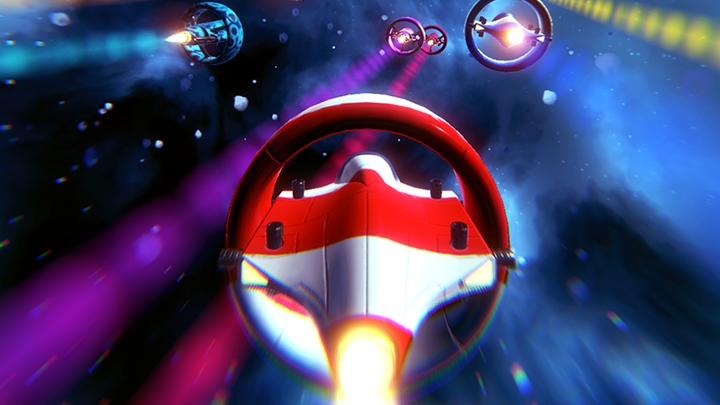Racing games are ultimately things you don’t have to go too deep into. VSR: Void Space Racing is no different. As a testament to how little there is to truly elaborate on, there’s no story mode to speak of. All you do is race. That’s it. Mentions of a story might as well have been omitted, honestly. On the other hand, there’s a fair bit to dive into with regards to the gameplay.
VSR is a futuristic racing game. The key idea that VSR sells itself on is the lack of friction, fittingly, as the ‘tracks’, if you can call them that, are all set in space. In that sense, the lack of friction seems like a welcoming new idea at first. But we’ll get back to that in a moment.
Races, regardless of mode, follow a certain structure. You must continuously pass through checkpoints that create a path for you to follow. Missing checkpoints incurs a penalty, such as a failure condition if too many are missed in single races, or added seconds in a time trial that can ruin an otherwise fast record. It may sound simplistic, and it is, but there’s one thing that creates a very steep learning curve: the previously mentioned lack of friction.
This mechanic is not a bad idea on paper. A space racer with no friction and thus a loosely controlling vehicle sounds like something complicated but otherwise very rewarding when mastered, and the game should be properly designed around it to ease a player who decides to pick it up. VSR is a mixed bag in terms of this design choice, and as a result can be tricky to play.
Now, this is not a control issue; the controls on your vehicle are very fine tuned. Controlling your vessel isn’t the problem, it’s controlling the vessel in what is effectively a game with perpetual ice physics that’s the potential deal breaker. You need mastery of how the lack of friction works against your control to even stand a chance at winning races. The footage you’re seeing right now is my initial attempts at learning the control. I eventually did get the hang of it, and it took me less attempts to finish every race, but not everyone is guaranteed to have the same amount of patience for mastering mechanics like this.
Ultimately, VSR has a good idea, just one that’s executed in a way which is not easy to grasp immediately.
If nothing else, the game looks and performs well. Outer space looks like what you’d expect from a futuristic style game, and the music goes for a techno-style mood with a unique track for each racing area. One knock against the game’s performance, though, is that it’s prone to incidental crashing. Granted, this was a rare occurrence that happened only twice in my playtime, and it only crashed in menus, but it’s not a good omen either way.
VSR is a tricky game to recommend. Players looking for a different type of racing game or something with a distinct learning curve can fill that niche with VSR, but as a blanket recommendation it’s a harder sell due to the latter. The best thing one can say about VSR is that the core mechanic is not a deliberate anger inducer, can be mastered and be a genuinely fun time after the hurdle of learning it is cleared, but a steep learning curve in a racer will not appeal to everyone.








